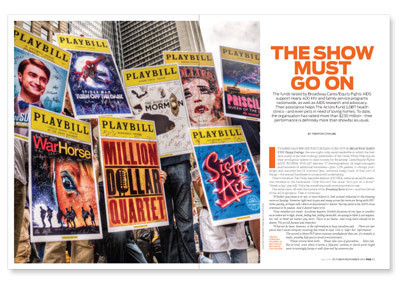
It’s mere days before the curtain goes up for Broadway Bares XXII: Happy Endings, the one-night-only saucy vaudeville in which the best (and many of the best-looking) performers of the Great White Way expose their prodigious talents to raise money for Broadway Cares/Equity Fights AIDS (BC/EFA). With 227 dancers, 17 choreographers, 32 stage managers and hundreds of additional volunteers—plus 1,076 pasties, G-strings, jockstraps and assorted bits of costume (yes, someone keeps track of that sort of thing)—the annual fundraiser is a mammoth undertaking.
Prior to the show, Tom Viola, executive director of BC/EFA, writes an email for everyone involved in the fundraiser. Only this isn’t the usual “let’s put on a show,” “break-a-leg” pep talk. Viola has something much more important to say.

His letter starts off with the history of the Broadway Bares show—and the history of the AIDS epidemic. Then it continues:
“Whether you know it or not, or even believe it, look around rehearsal or the dressing room on Sunday. Someone right next to you and many across the room are living with HIV. Some quietly, perhaps well; others in deep denial or shame. But my point is the AIDS virus continues to be passed. And it doesn’t have to be.
“Now mistakes are made. Accidents happen. Foolish decisions of one type or another occur when we’re high, drunk, feeling bad, feeling invincible, too young to think it can happen, too ‘old’ to think we matter any more. There is no blame. And truly there should be no shame. We are all human and imperfect.
“What we do have, however, is the information to keep ourselves safe.… There are two pieces that I want everyone receiving this email to read. One is ‘Safer Sex’ information…. The second is about PEP [post-exposure prophylaxis] that can, if a mistake is made, possibly help you to avoid seroconversion.…
“Please review them both.… Please take care of yourselves.… Have fun. But be kind, even when it seems a flippant, careless or harsh word might seem screamingly funny or well-deserved by someone else.
“Most of all, I hope you will arm yourselves with two things: Information and the self-esteem to access it.”
The letter exemplifies Viola’s leadership style—informed and educational, honest, uplifting and accessible. For Viola, his job isn’t simply to raise money to help people with HIV. He sincerely cares about the health and well-being of the entire Broadway community.
The email was a smashing success (search “letter from the executive director” on broadwaycares.org to read its entirety). It sparked a series of conversations, Viola says. People pulled him aside to talk about fears of disclosing their own serostatus—performers want to appear 110 percent fit 24/7—and to ask about HIV testing and PEP. Others wanted to thank him for having such a specific conversation about safe sex and HIV.
And Broadway Bares? The event raised $1.25 million. A very happy ending indeed. And that’s just one night, and one of BC/EFA’s many iconic events. From 1987 through today, the organization has raised more than $230 million.
Where does all that money go? How, exactly, is it put to use? As most performers in any hit production can tell you, the real story and drama take place off stage.
First, a bit of backstory. In the mid-1800s, much of proper society and the religious hierarchy viewed actors as people of dubious character. Because of the shame and stigma associated with the craft, would-be thespians were often forced to run away from home and change their names. They were outcasts. Many churches wouldn’t even bury actors in consecrated ground. But the entertainment community banded together to take care of their own. In 1882, they formed The Actors Fund. One of its first orders was to procure burial plots; another was to set up financial resources to assist those who fell on bad times or illness.
Then and now, the term “actor” refers to anyone employed in the entertainment business, from writers and directors to stagehands and makeup artists. As the industry advanced across the nation and encompassed entertainment on the radio, then film, TV and the Internet, The Actors Fund grew, too. So has the need for its safety net. “People working in the arts have incomes that are seasonal at best, and modest,” says the fund’s president and CEO, Joe Benincasa, pointing out that most actors don’t work enough hours to qualify for health insurance.
In response to AIDS, The Actors Fund started the HIV/AIDS Initiative in 1987, a service for entertainers living with the virus. Motivated by a fellow cast member dying of the disease, actress Colleen Dewhurst spearheaded the formation of Equity Fights AIDS to raise money for the HIV/AIDS Initiative. Viola, who was Dewhurst’s assistant, became its front man. Around the same time, an unrelated group formed in the theater world with the goal of raising money for AIDS organizations. It was called Broadway Cares, and in 1992, the two merged as Broadway Cares/Equity Fights AIDS.
As the epidemic changed, so did The Actors Fund and BC/EFA. “In 1988, people were dropping dead in front of each other,” Viola recalls. “You could enter a rehearsal period and before that six-week period was over, two, three or any number of folks in that group of 30 or 40 people could have dropped out because of AIDS. We all saw it.” Then, in 1996 came the arrival of antiretrovirals for HIV, and BC/EFA began to expand the scope of its funding, supporting every type of social service at The Actors Fund. To date, BC/EFA has awarded more than $65 million—including $4.5 million this year—to various programs at The Actors Fund.
These include non-HIV specific programs such as the Al Hirschfeld Free Health Clinic, The Actors Fund Work Program (to retrain actors for other fields), The Dancers’ Resource and the Phyllis Newman Women’s Health Initiative. Of the latter, Viola says: “It seemed not only fair but also our responsibility to step up for the women in the community as they had rallied for us around the issue of HIV/AIDS.”
Expanding the safety net under the umbrella of HIV/AIDS, Viola says, enables him to connect to thousands of folks in the community who aren’t directly impacted by the virus. “It allows me to talk about HIV/AIDS to the entire theatrical community.” Keeping HIV/AIDS on people’s minds is no small feat during a time of AIDS fatigue, when many people think the virus is a manageable disease—if they think of it at all.
Plus Viola says, “It keeps people engaged. The more people who are assisted by the safety net of social services provided by The Actors Fund, the more people will want to be a part of our continued fundraising activities. This ensures we can continue to honor our mission of outreach to people living with HIV/AIDS.”
The HIV/AIDS Initiative remains a central focus and beneficiary of BC/EFA; it received $2.1 million in 2012 alone. “There are as many people assisted annually in the HIV/AIDS Initiative in 2012 as there were in 1995,” Viola says—Benincasa puts the number between 650 and 700—“but today not as many are dying; they’re provided with a different type of service.”
It’s a holistic approach, says Benincasa of The Actors Fund. “If someone comes to you with HIV, they have a medical need, but they might also have a financial need, a housing need, an employment training need, a financial planning need.” Caseworkers help clients navigate these issues. Addiction and mental health services are available, as are nursing homes and supportive housing for people with HIV/AIDS, including the 30-story Dorothy Ross Friedman Residence in Manhattan, the Schermerhorn in Brooklyn and the Palm View Residence in West Hollywood—all supported, in part, from those dollar bills stuffed into G-strings at Broadway Bares.
The Bares burlesque is but one of several annual BC/EFA events that have growover time and in scope to become beloved traditions. The Broadway Flea Market & Grand Auction started as two tables set up outside the Chorus Line stage door. Last year’s flea market, held in September, was a daylong bonanza that boasted 63 tables in the heart of the theater district; celebrities posed for photographs, and Broadway casts sold rare memorabilia, such as Spider-Man bracelets made of the web-slinging cables used in the show.
There’s also the annual Fire Island Dance Festival—which is part of BC/EFA’s Dancers Responding to AIDS program—and Classical Action, a series of intimate performances (think: a private Tribeca home) by big-name classical artists such as mezzo-soprano Stephanie Blythe and pianist Warren Jones.

Among other events, BC/EFA also produces Broadway Barks, a pet adopt-a-thon founded by Mary Tyler Moore and Bernadette Peters that raises money to help more than 26 local pet shelters and to cover vet costs. It also highlights the importance of spaying and neutering animals. What’s this have to do with HIV? “It creates good will for us as an organization,” Viola explains. “It’s a wonderful day for the entire community that fuels our fundraising efforts. Plus, I love dogs.” More than 600 animals have found homes through Broadway Barks, including a husky who spends time at the BC/EFA offices (that’s one lucky pooch; Viola and company enjoy an enviable view of Times Square).
But the fundraising initiative that theatergoers are most likely familiar with is what BC/EFA calls its “Audience Appeals.” Twice a year, for six weeks, entire companies of Broadway, off-Broadway and national touring productions volunteer their time so that their star talent—Hugh Jackman and his megawatt charm, Whoopi Goldberg and her intelligent humor—can return to the stage after the closing curtain and ask audiences to support BC/EFA by purchasing special merchandise, such as posters autographed by the entire cast, and by dropping a cash donation in a bucket on their way out. The appeal lasts mere moments, but when you consider that the entire company—musicians in the pit, lighting technicians, everyone—must work later to navigate the extra demands, it is quite a commitment. The appeals season culminates with two events—the Easter Bonnet Competition each spring and Gypsy of the Year each fall—in which casts of shows participating in the appeals take to the stage for original songs, skits, dances and mind-blowing millinery. “You don’t want to get all mushy about show business people,” says show business legend Nathan Lane, “but they really do put their all into [BC/EFA productions], and they are some of the best shows in town.” In 2011, Gypsy and its appeals season brought in a record-breaking $4.9 million.
About half the money BC/EFA raises each year goes to The Actors Fund, but the other half gets divided among nearly 400 programs that primarily serve AIDS and family service organizations; funds also go to 17 LGBT health clinics across the nation. Last year, the programs that received BC/EFA grants included 123 meal delivery programs in 34 states and 375 AIDS service organizations in 47 states, plus advocacy organizations and AIDS research groups such as the International AIDS Vaccine Initiative (IAVI) and the Foundation for AIDS Research (amfAR). Money went to harm reduction programs, case management and emergency financial assistance. BC/EFA also grants about a half a million dollars internationally, mostly to AIDS service centers in South Africa in acknowledgement of fundraising done by the actors in The Lion King.
Twice each year, a BC/EFA national grants committee sifts through hundreds of applications. The committee is comprised of stage managers, performers and other industry professionals who helped raise the funds. Making them part of the process, Viola says, shows them how the money is put to use, which in turn engages them to help again. “It’s the most rewarding experience,” agrees Sherry Cohen, stage manager at Mamma Mia!, “to know that all these organizations are benefiting from what the Broadway community has done.”
What’s more, says Kirsten Felix Burkhart, executive director of AIDS Resource in Williamsport, Pennsylvania, is that the grant application form is easy and quick to fill out—a rarity—which means caregivers don’t get mired in paperwork. Burkhart is a longtime Broadway buff, so once she started at AIDS Resource—she also oversees West House Personal Care Home, which caters to people with HIV—her first order of business was to call BC/EFA. That relationship, she says, has saved lives.
“We would be out of business without their support,” Burkhart says. In addition to supplying tens of thousands of dollars in food for her clients, BC/EFA stepped in for emergency support. “A couple of years ago, our offices were broken into and vandalized, and someone stole $5,000 worth of our food cards,” Burkhart recalls. “Tom [Viola] heard about it from a friend and sent us a $5,000 check, just like that. West House would literally not be open if not for BC/EFA’s support.”
Kevin Winge, executive director of Project Open Hand, a meal service program in San Francisco, points to another state of emergency: the national recession, which fuels job losses while depleting everyone’s ability to offer donations. “We’ve seen about a 10 percent increase in demand for services—and a 10 percent decrease in funding,” he says. “But Broadway Cares is still in the fight and still doing innovative fundraisers.”
And BC/EFA is situated to respond to the HIV community’s unique needs. Regulations prevent the AIDS Foundation of Chicago from using government funds for advocacy work, explains David Munar, that group’s CEO and president. BC/EFA helps fill that financial gap. “They’ve supported our efforts to lobby [local politicians in Springfield, Illinois,] and impact state laws, the HIV budget and Medicaid reform.”
Munar adds: “They’ve also supported our work in HIV prevention technology.” BC/EFA was one of the first supporters of what is now called the International Rectal Microbicides Advocates, or IRMA, which explores anti-HIV gels, lubricants and douches that may curb infections. “[At first,] we got sneers and giggles, and people thought it was not a serious area of investigation,” Munar recalls. “But Broadway Cares understood that to make a difference in the epidemic, we have to deal with unprotected anal intercourse. Because Broadway Cares has an enormous reputation, [their support of IRMA was] a stamp of approval. Their early grants for IRMA helped open the door to other funders. Now, it’s a fledgling area of scientific inquiry, and it’s taken more seriously.”
Fundraising events themselves are opportunities for BC/EFA to educate and raise awareness, and those events aren’t confined to the ZIP codes of Times Square. When theatrical productions travel the country, they often bring their BC/EFA know-how on the road. The casts of Wicked and The Lion King held cabaret-style fundraisers while in Charlotte, North Carolina, benefitting not only BC/EFA but also RAIN, the Regional AIDS Interfaith Network (grants from BC/EFA comprise RAIN’s Benevolence Fund, an emergency resource that in one instance helped an HIV-positive woman pay for copies of her children’s birth certificates, paperwork she needed in order to move her family out of a shelter and into secure housing).
Local theaters, inspired by BC/EFA, have gotten in on the act as well, and Viola has worked to establish connections with thespian societies through colleges and high schools. “It does give us the opportunity,” he says, “to have conversations about safe sex and AIDS awareness—in a way different than someone would have to approach it in health class.” In other words, minus the political and church-driven barricades.
“One of the most important and beautiful aspects of what Broadway Cares/Equity Fights AIDS does, is that it’s a way for people to know that you have to take care of yourself,” says actress and participant Judith Light. “It’s there to keep reminding people [about HIV] and to keep people talking about it so that we don’t keep perpetuating the virus.”
Viola takes this responsibility to heart, and he speaks openly about his own seroconversion in 1993. This makes him somewhat of a father figure—more like grandfather figure, he jokes—for the entertainers. “Any number of folks have walked in this office and asked, ‘Can I shut the door?’” Viola says. “I know what’s coming next: tears [and a disclosure that they’ve tested positive]. I let them know that they’re not, even in this tiny office, isolated in this experience. Because it’s the secrecy that keeps people from taking care of themselves.
“The theater community’s extraordinary generosity of spirit is BC/EFA’s greatest resource. It is a rare blessing,” Viola says. “In turn, it’s my hope that BC/EFA will always be a haven for folks struggling or in crisis and [that it will always be] a home for those who want to do something about it.”
As Viola illustrated in his Broadway Bares missive—and as those performers proved onstage that night—it is possible to educate and inspire, to look after one another, all while putting on one hell of a good show. “Broadway Bares celebrates the joys of sex and all sexuality safely and without exploitation,” Viola says. “In doing so, it has raised millions of dollars. But if, at the same time, it can prompt a dialogue, particularly among those involved in the production, about safe sex, the history of the epidemic and the need for us still to take very specific care of ourselves and each other, it will be worth doing for much more than any amount of money raised.
“It can carry a message,” Viola concludes, “that hopefully will resonate long after the dancing is done.”







1 Comment
1 Comment